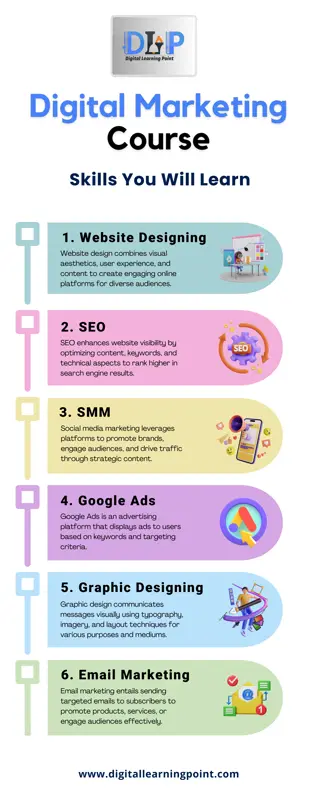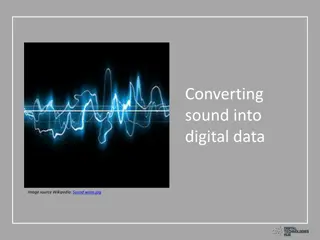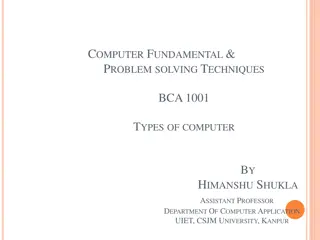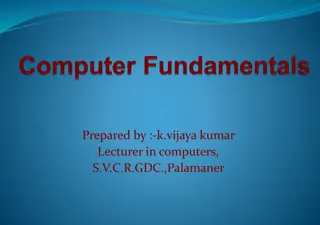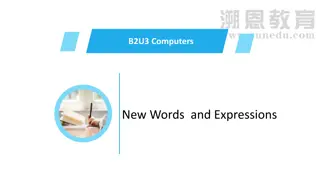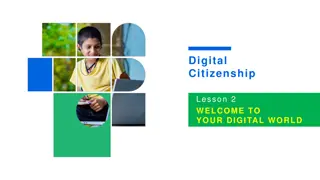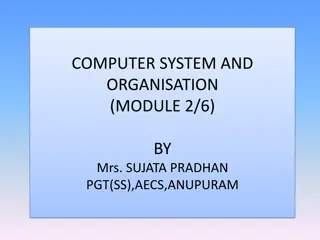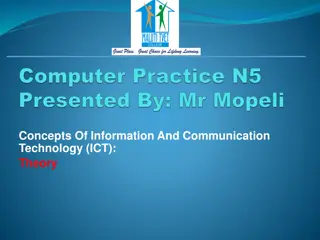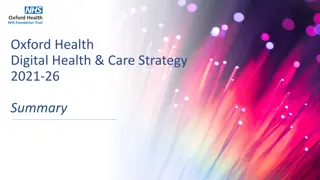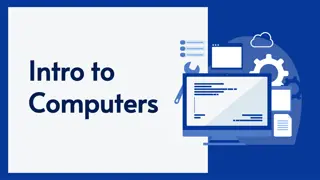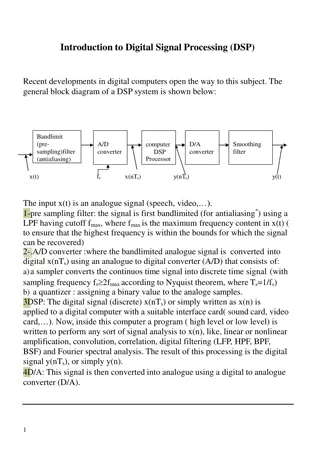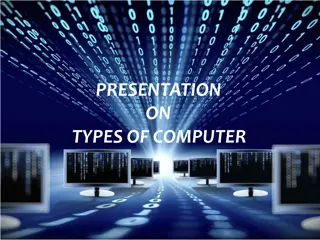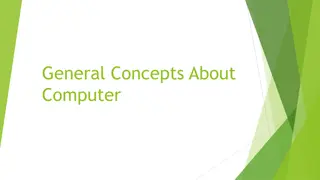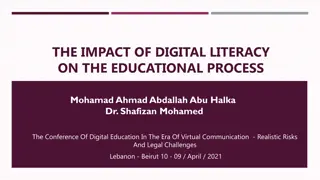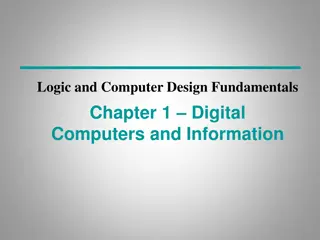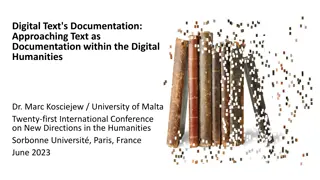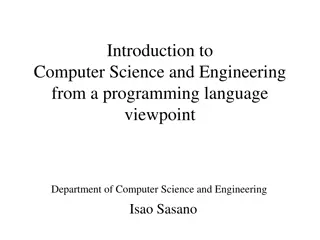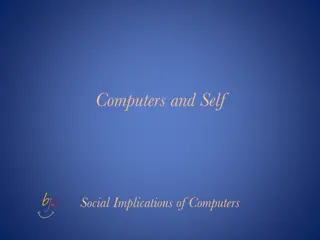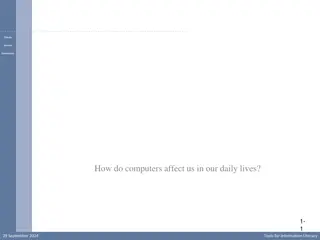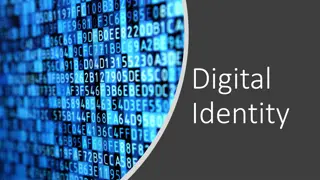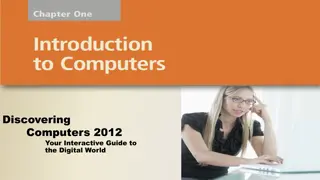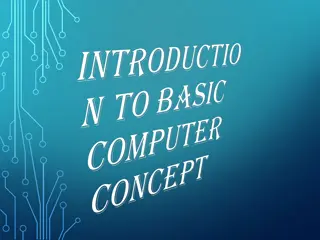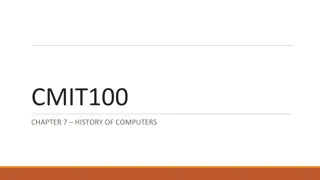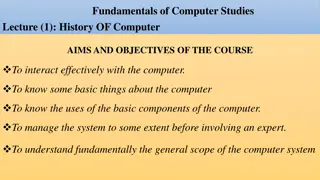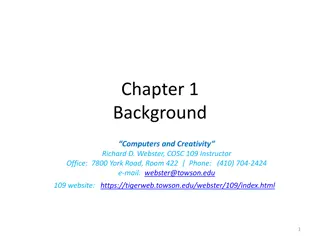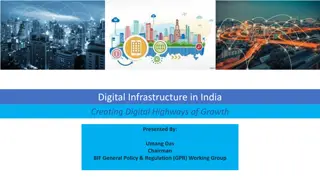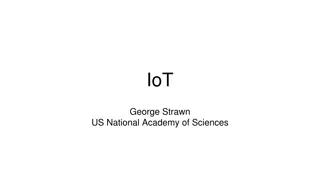Digital Competency Maturity Model 2.0 for Accounting Firms - Overview and Implementation
The Digital Competency Maturity Model 2.0 (DCMM 2.0) is a framework designed to help professional accounting firms evaluate and enhance their digital competencies. Released as an upgrade to the previous version in 2017, DCMM 2.0 offers a structured approach for firms to assess their current level of
4 views • 19 slides
Understanding Digital Media: A Grade 3-5 Introductory Lesson on Digital Wellness
Explore the importance of digital wellness and learn how to maintain a balance between digital and face-to-face interactions. The lesson covers concepts of citizenship, etiquette, and safety in the digital world, along with exploring what digital media is and how it shapes our everyday lives. Activi
0 views • 11 slides
Empowering Communities with Discover Digital Project: A Guide to Digital Health and Wellbeing
Discover Digital Project aims to raise awareness of digital tools for health and wellbeing, offering training and resources to enhance digital literacy and access to healthcare services. The project includes grant schemes, roadshows, and workshops to empower communities and staff with the knowledge
9 views • 17 slides
Essential Factors Affecting Computers' Maintenance
Computers are susceptible to damage from various factors such as heat, dust, water, corrosive liquids, and powerline problems. To ensure optimal performance and longevity, it is crucial to monitor and address these elements to prevent potential harm. Proper maintenance practices like controlling hea
5 views • 14 slides
Digital Learning Point
Digital Marketing is a profoundly unique field where procedures and patterns develop rapidly. Join Digital Learning Point for the best digital marketing course in Haldwani, and we will help you to know each and every aspect of Digital marketing.\n\nDigital marketing course in Haldwani | Digital mark
7 views • 1 slides
Understanding the Conversion of Sound to Digital Data with ADC
Sound waves are converted into digital data using an Analog-to-Digital Converter (ADC) to enable computer processing. The ADC captures snapshots of the sound wave at specific intervals, turning them into numerical codes that computers can interpret. The sample rate determines the frequency of these
1 views • 18 slides
The Impact of Computers in Everyday Life
Computers play a vital role in various aspects of our daily lives, from education to business, healthcare, and banking. They help in converting data into meaningful information, enabling digital learning in schools, supporting businesses in marketing and management, aiding doctors in quicker diagnos
0 views • 9 slides
Types of Computers: Supercomputer, Mainframe, Mini, Workstation, Microcomputer
Computers come in various sizes and power ranges, each with unique capabilities. Supercomputers analyze nuclear fission models, mainframe computers have special circuits, mini computers support multi-user environments, workstations offer high processing speed, and microcomputers are affordable perso
0 views • 5 slides
Introduction to Computer Fundamentals: Learn the Basics of Computers
This tutorial covers fundamental concepts of computer hardware, software, and operating systems, explaining how computers process data, generate output, and store information. It explores the advantages of computers, such as high speed, accuracy, storage capacity, diligence, and versatility, essenti
1 views • 11 slides
Introduction to Computers: New Words and Expressions
Explore the fascinating world of computers with new terminology and expressions such as artificial intelligence, technology, exploration, and more. Discover the language surrounding computers and their applications, functions, and development. Enhance your understanding of this technological realm t
1 views • 19 slides
Introduction to Embedded Systems Design
Embedded Systems Design, Chapter 1 provides an insightful overview of embedded systems, distinguishing them from general-purpose computers. The chapter delves into the characteristics of embedded systems, their design considerations, and the various types of embedded computers such as general-purpos
1 views • 7 slides
Understanding Your Digital World: An Introductory Lesson on Digital Citizenship
Explore the fundamentals of digital citizenship in Lesson 2 of this engaging course. Uncover the ins and outs of computers, computing devices, input-output processes, and essential terminology. Dive into the significance of computers in the realm of digital citizenship and get hands-on guidance on w
2 views • 16 slides
Understanding Computer Systems and Organizations
In this module by Mrs. Sujata Pradhan, learn about the characteristics of computers, their basic architecture, and the role of different units and memory types. Explore the classification of computers based on operation and configuration, including digital, analog, hybrid, supercomputers, mainframes
0 views • 13 slides
Understanding Types of Computers in Information and Communication Technology (ICT)
Explore the main types of computers in ICT, including Mainframe Computers, Servers, and Personal Computers such as Desktops, Laptops, and Tablets. Learn about their functions, uses, and distinguishing features to enhance your understanding of ICT.
1 views • 20 slides
Oxford Health Digital Health & Care Strategy Summary 2021-26
This summary outlines the key aspects of the Oxford Health Digital Health & Care Strategy 2021-26, which is crucial for the Trust strategy. It covers digital ambitions, strategic objectives, digital empowerment, improving access to digital alternatives, enhancing self-help and online care, digital c
0 views • 8 slides
Understanding Computers: Key Components and Characteristics
A computer is a programmable electronic device designed to process, store, and retrieve data. This article delves into the key components and characteristics of computers, including hardware, software, data processing, storage, input/output devices, networking, and programming. Computers play essent
0 views • 36 slides
Overview of Digital Signal Processing (DSP) Systems and Implementations
Recent advancements in digital computers have paved the way for Digital Signal Processing (DSP). The DSP system involves bandlimiting, A/D conversion, DSP processing, D/A conversion, and smoothing filtering. This system enables the conversion of analog signals to digital, processing using digital co
1 views • 24 slides
Understanding Different Types of Computers
Explore the classifications of computers based on functionality, size, speed, and cost. Learn about analog, digital, and hybrid computers, their characteristics, and examples. Understand the distinct features and uses of each type in the world of computing.
6 views • 10 slides
Exploring General Concepts About Computers
Computers are electronic devices capable of accepting data, processing it based on instructions, and generating output. They can perform functions like input, processing, output, and storage. This article delves into the basics of what computers are, the difference between data and information, exer
0 views • 15 slides
Evolution of Computers: From Vacuum Tubes to Transistors
The evolution of computers has seen remarkable progress from the era of vacuum tube machines to the introduction of transistors. Starting from massive devices to compact and powerful systems, computers have become an indispensable part of modern life. Explore the generations of computers, their func
0 views • 22 slides
Digital Skills Pack March 2021 Overview
This document provides insights into the demand for digital skills in various industries, focusing on the West of England region. It analyzes digital career pathways, skills demanded, and labor market trends. The report highlights the growth of the Digital Sector, key skills for digital jobs, and wa
1 views • 39 slides
Understanding the Computer Fraud and Abuse Act (CFAA) of 1984
The Computer Fraud and Abuse Act (CFAA) of 1984, later amended in 1992, addresses criminal and civil liability for unauthorized access to computers and obtaining information. The law distinguishes between outsiders and insiders who exceed their authorized access. It includes provisions related to na
12 views • 33 slides
Understanding Basic Concepts of Information Technology
Explore fundamental concepts in Information Technology including basic terms, types of computers, hardware, software, and general IT concepts. Learn about different types of computers such as supercomputers, mainframe computers, servers, networked computers, personal computers, laptops, and handheld
1 views • 13 slides
Teaching Staff Digital Experience Insights Survey Results 2020-21
This presentation provides insights from the Teaching Staff Digital Experience Insights Survey for the year 2020-21. It focuses on key metrics related to technology at the organization, technology in teaching, and the development of digital skills among teaching staff. The survey collected feedback
2 views • 26 slides
The Impact of Digital Literacy on Education in the Era of Virtual Communication
The concept of digital literacy encompasses skills for using digital devices and technologies, evaluating digital content, and more. The educational process has been significantly influenced by digital technologies, leading to both positive impacts and challenges. The COVID-19 pandemic has accelerat
0 views • 20 slides
Digital Computers and Information Representation Fundamentals
Explore the basics of digital systems, number systems, arithmetic operations, and information representation in computers. Dive into binary, octal, and hexadecimal systems, along with signal processing and number system examples. Gain insights into computer organization and assembly language, utiliz
0 views • 28 slides
Impact of Digital Communication on Social Inequality
The impact of digital forms of communication in a global context highlights the existence of a digital divide based on social inequality, particularly regarding access to information and communication technologies. This digital gap is evident within countries like the UK, where disparities exist bet
2 views • 12 slides
The Importance of Digital Text Documentation in the Humanities
Approach digital text as documentation in the digital humanities is essential for its materialization and interaction. Digital technologies allow text to be easily manipulated and shared across platforms, highlighting the need for proper documentation. This documentation determines how text is prese
0 views • 18 slides
Overview of Computer Science: From Analog to Digital Computing
Explore the evolution of computing from analog devices like sundials and slide rules to mechanical digital computers by Charles Babbage, and the groundbreaking ENIAC - the first general-purpose digital computer. Delve into the concept of encoding information in digital computers using binary numbers
0 views • 42 slides
Implications of Computers on Human Existence and Behavior
Exploring the philosophical debate between free will and predestination, the influence of online personas on real-life identities, the potential for computers to understand us better than ourselves, and the evolving role of humans in an increasingly automated world. These themes delve into the compl
0 views • 6 slides
Evolution of Computers in Daily Life
Computers have significantly transformed our daily routines over the years, from simple tasks like setting alarms to complex operations like online shopping and banking. The progression from basic functions to advanced capabilities has revolutionized how we interact with technology on a day-to-day b
0 views • 36 slides
Understanding Digital Identity in the Modern Age
Exploring the concept of digital identity, this content delves into the various forms it takes, such as personal information and online behaviors. It discusses the learning outcomes related to digital identity in educational settings, including analyzing bias in digital texts and understanding emplo
0 views • 7 slides
Introduction to Discovering Computers: Your Interactive Guide to the Digital World
Delve into the world of computers with "Discovering Computers 2012," exploring basic concepts such as the definition of a computer, its components, importance of computer literacy, and the role of computers in various sectors. Discover the distinctions between system and application software, types
0 views • 38 slides
Special Pricing on Surplus Computers - Dell, Optiplex, iMac, Monitors
Explore a variety of surplus computers including Dell Optiplex GX series, iMac G4 & G5, and monitors at discounted prices. Contact the surplus specialist for availability and grab deals starting from $50. All computers come with essential accessories like keyboard, mouse, and power cord.
0 views • 4 slides
Evolution of Computing: From Abacus to Computers
The history of computing traces back to the invention of tools like the Abacus and Napier's Bone, leading to the development of advanced computing devices such as slide rules and ultimately modern computers. Computers have evolved to become programmable machines that receive input, process data, and
0 views • 7 slides
Evolution of Computers: From Abacus to Personal Computers
Explore the fascinating journey of computers through history, from the invention of the Abacus in 4000 BC to the development of personal computers in the modern era. Learn about the four generations of digital computers, the impact of integrated circuits, shifts in programming languages, and societa
0 views • 17 slides
Fundamentals of Computer Studies: Understanding the Evolution and Importance of Computers
Computer studies cover the history, aims, and objectives of computers, emphasizing their vital role in today's world. The course explores basic computer components, data processing, and the transformation of manual tasks to automated processes. Computers are indispensable tools for efficiency and pr
0 views • 13 slides
Understanding Digital and Analog Information in Computers
Explore the concepts of digital and analog information in computers through examples like thermometers, sound, and sight. Learn how computers process discrete digital data compared to continuous analog information, and why understanding both is essential in digital media courses. Delve into the conv
0 views • 49 slides
Digital Infrastructure in India: Creating Pathways for Economic Growth
Digital infrastructure in India plays a crucial role in driving economic growth and development. The focus on creating a national digital grid and catalyzing investments in digital infrastructure is essential for the country's digital transformation. Improving digital infrastructure can unlock signi
12 views • 10 slides
Evolution of IT: Three Generations and the Impact of IoT
Understanding the evolution of Information Technology through three generations - from connecting people to computers and information on the internet to the current Internet of Things (IoT) era where computers interact without human intervention. The potential for IoT to connect computers, access in
0 views • 8 slides




